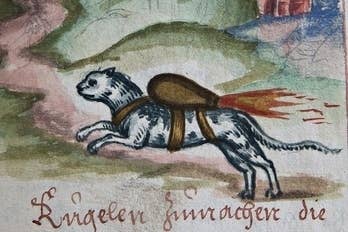"Save the rocket cats," US gov't tells devs
National Endowment for the Humanities rep implores studios to preserve more than just their finished games
While many of the speakers at the Game Developers Conference spend their sessions talking about the future of the industry, National Endowment for the Humanities senior program officer Jason Rhody used his time at the podium Wednesday afternoon to talk about the past.
As part of a session on how US federal agencies are investing in games, Rhody made his case for preservation with the help of an image from a 1607 journal manuscript depicting cats and birds with primitive jetpacks attached to their backs that were supposedly used to infiltrate and burn villages and castles. Bizarre as the idea might be, it is exactly the sort of fascinating cultural artifact Rhody worries could be lost forever in the current game industry.
"Save the rocket cats," Rhody begged the audience.
Many studios have no formal archival process that extends much beyond keeping an executable file of the finished game, Rhody said. But software is the product of whitepapers, engineering specs, memos, venture capital, Mountain Dew, and espresso.
"These are material circumstances that leave material traces," Rhody stressed. "So these are your archival materials, as much as the game itself. Maybe not the Mountain Dew cans, but the rest of it. So the lesson of rocket cat is that you don't know what hidden easter egg, what manuscript, what material trace will cause a future scholar's heart to swell with joy when they find it."
Just as creators today draw inspiration from what people must have considered mundane records (such as Assassin's Creed IV: Freedom Cry developers consulting classified ads of the time to inform their depiction of slavery), so too will enthusiasts, scholars, and creators of tomorrow examine the minutia of game development today to get a better understanding of things we aren't even aware will be of interest.
"There may be all sorts of legal, competitive reasons and copyright reasons one can't share all of that," Rhody acknowledged. "But I appeal to any of you with access to or control of that kind of work, to share what you can, when you can. And even more importantly, to work with scholars and librarians to preserve the rest of those archival materials. Because what you do is valuable, and our mission at the NEH is to help preserve and interpret our shared valuable, cultural heritage."

